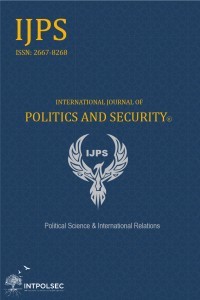Russia's Arctic Policy: Economic Development, Regional Priorities, Territorial Sea
Küreselleşmenin doğa ve çevreye çokyönlü etkisi, dünya coğrafyasındaki fiziksel değişimlerin de tetiklenmesiyle yirmibirinci yüzyılda daha da netleşti. Dünyanın kutuplardaki keşifleri ve bölgesel taramaları, değişen ve farklılaşan coğrafi olaylarla küresel, bölgesel ve ulusal ölçekte politikalara dönüştü. Arktik, sadece Kuzey kutbundaki Arktik Kuşağı dahilinde ve Arktik Okyanusuna kıyıdaş olan ülkelerin değil, bölge-dışı ve uluslararası örgütlerin de dahil olduğu yeni bir yaşam bölgesi haline gelmiştir. Bu makale, 21. yüzyılda Rusya'nın bölgesel ve uluslararası Arktik politikası hakkında kapsamlı bir çalışma yürütmeyi amaçlayan Rusya Federasyonu Arktik Bölgesi (RFAB) merkezinde kronolojik bir zaman çizelgesi oluşturmaktadır.. Rusya’nın son yirmibeş yılda yoğun çalıştığı Arktik'teki deniz/okyanus politikasını ve son yıllarda hızla uygulamaya koyduğu bölgesel politikalarını, Medvedev’in ‘Rusya’nın Modernizasyonu’ yaklaşımıyla açıklamıştır. Bu teorik yaklaşım, neo-liberal yaklaşım ile neo-realist politikalarına Rusya Federal yönetim yapısı ve politik kültürünün eklenmesiyle ortaya çıkmıştır. Bu makale Rusya’nın yeni ‘Modernleşme’ yaklaşımıyla incelenmiş; Rusça ile İngilizce bilimsel kaynaklar kullanılmıştır.
Anahtar Kelimeler:
ARKTİK BÖLGESİ, RUSYA, BÖLGESELCİLİK, ÇOKTARAFLI İŞBİRLİĞİ, KARASULARI
Russia's Arctic Policy: Economic Development, Regional Priorities, Territorial Sea
The multifaceted impact of globalization on nature and the environment became even clearer in the 21st Century, when physical changes on the world's geography were also triggered. Explorations and regional surveys of the world at the poles have been evolved into policies on a global, regional and national scale, with changing and differentiating geographical events. The Arctic is a new area of life, including not only countries within the Arctic circle at the North Pole and riparian to the Arctic Ocean, but also extraterritorial and international organizations. This article examined a chronological time-line on the core of Arctic Zone of the Russian Federation (AZRF), aims at carrying out a comperehensive research on Russian regional and international Arctic policy within the Post-Soviet period. Russia's sea/ocean policy in the Arctic, which it has worked hard for the last thirty years, and its policies that it has implemented quickly in recent years, are plained by D.Medvedev's ‘Modernisation of Russia’ reformist approach. This theoretical approach arose from the addition of the Russian Federal administrative structure and political culture to its IR-neo-liberalist and neo-realist policies. This article also discussed in Russia’s new ‘Modernisation’approach. Russian and English scholarly sources were used in this article.
Keywords:
ARCTIC ZONE, RUSSIA, REGIONALISM, MULTILATERAL COOPERATION, TERRITORIAL SEA,
___
- REFERANS 2. BBC. The Compass. How climate change is heating up the Arctic’s geopolitical landscape?. Accessed.
- ISSN: 2667-8268
- Yayın Aralığı: Yılda 2 Sayı
- Başlangıç: 2019
- Yayıncı: Fikret BİRDİŞLİ
Sayıdaki Diğer Makaleler
Arktik Bölgede Çevresel Bozulma, Strateji ve Rekabet: Çevresel Güvenlik Bağlamında Bir Değerlendirme
İsmail Utku CANTÜRK, Senem ATVUR
Kuşak ve Yol Girişimi Bağlamında Çin’in Arktik Politikası
Importance of the Arctic in the Framework of Air Power Theory
Arktik Yerli Halkları için İnsan Güvenliği Sorunu Olarak İklim Değişikliği
Arktik Konseyi ve Türkiye’nin Unutulan Arktik Konseyi Gözlemci Üyelik Başvurusu: İsviçre Örneği
Evolving Arctic Security Architecture Towards a Cooperative One
Arktik Bölgesinin Kopenhag ve Aberystwyth Ekolü İle İncelenmesi
Arktik Bölgesinde Yaşanan Güncel Sorunlar ve İkili Anlaşmazlıklar
Climate Change and Hard-Soft Security Nexus: Future of Arctic Security Cooperation
